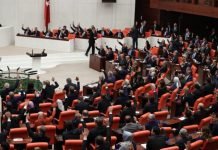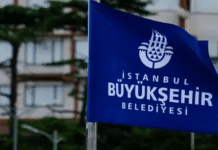
As political tension escalates days before the critical referendum on Sunday over a radical switch to executive presidency, widespread oppression over naysayers and abuse of religious sentiments have soared immensely.

Ökkeş Namlı, mayor of the Düziçi Municipality in southern province of Osmaniye, has threatened to fire municipal workers if they vote “no” in a referendum, the haberdar news website reported on Thursday. Speaking in the presence of ruling Justice and Development Party (AKP) deputies, AKP member Namlı said: “If they eat the bread of the AKP and do not vote [‘yes’], may they get no benefit from it. I am talking before the district head of the party and its deputies. While your children are there [jobless], I am vile if I keep them [those who vote ‘no’ in the referendum] there [as municipal workers].”
Namlı said those people who work for the municipality and vote “no” are vile and dishonest as well.
In a similar development, a district governor in the Tutak district of the eastern province of Ağrı has threatened to cut off agricultural subsidies granted to the residents if their villages vote against a constitutional reform package that will be put to a public vote this Sunday, according to pro-Kurdish Peoples’ Democratic Party (HDP) deputy Dirayet Taşdemir.
Taşdemir, who submitted a parliamentary question meant for Prime Minister Binali Yıldırım, asked him about the claims raised by the villagers of the Tutak district. According to the villagers, Tutak district governor Erkan İsa blocked the payment of agricultural subsidies to them, and if a “yes” vote does not emerge from the ballot box in those villages, the agricultural subsidies will be completely cut off. Taşdemir asked Yıldırım whether an investigation has been launched into the claims.

Meanwhile, an İstanbul Municipality personal said if the constitutional amendments are approved, naysayers’ wives and daughters will be halal, or permitted, as plunder and sex slaves for “yes” voters.
“Dear friends. The CHP clearly declared war and has been fighting at full force. They have spread the aggression they launched in Parliament on ‘yes’ voters with their words and deeds. When we win the war on April 17, the wives and daughters of those who vote ‘no’ will be halal to ‘yes’ voters as plunder,” said Ömer Akbayrak, a worker at the İstanbul Municipality, in a social media message on Tuesday.
“In fact, it is necessary to check the laws of war in Islam. When I said ‘halal,’ it means they can be your concubine. In any case, let us win the war first; then we can think about it,” he said in a subsequent tweet. Akbayrak also likened naysayers to Nimrod and Pharaoh, saying: “They declare war and we wage jihad, and we will have booty until Judgment Day.”
The municipality announced that Akbayrak has been suspended and that an investigation has been launched into him.

Furthermore, Hayrettin Karaman, a leading theologian and issuer of fatwas, or religious edicts, for ruling Justice and Development Party (AKP) circles and Turkey’s autocratic President Recep Tayyip Erdoğan, wrote in his column in pro-Erdoğan Islamist daily Yeni Şafak on Thursday that casting a “yes” vote in a referendum on April 16 is a fard, the Islamic term for a religious obligation.
“If we say, ‘yes,’ the process which began under Erdoğan’s leadership in 2002 will continue. If a ‘no’ vote is cast, there will be a gradual return to the old, which is bad. … Taking a step that will bring us closer to our goal by saying, ‘yes’ falls within the principle of ‘every action which completes a fard and makes someone get closer to it is a fard’,” wrote Karaman.
Karaman, a well-respected figure among political Islamist groups in Turkey and regarded in high esteem by Erdoğan, frequently makes controversial statements on the name of Islam that favor Erdoğan and the AKP government. In February, he said the people must help the government in a purge of the faith-based Gülen movement. He also said mistakes made during government purges must be ignored. Karaman had also said that the “no” voters in the April 16 referendum are opponents of Islam.
Imams of mosques under the control of the Directorate of Religious Affairs (Diyanet) have also been participating in the government campaign. An imam in İstanbul’s Ümraniye district accused naysayers of “treason” and “ignorance,” while an imam leading a group of Turks during Umrah in Mecca labeled naysayers as “infidels.”
Speaking during a live show on the pro-government Beyaz TV in early February, Vehbi Güler, a theologian and a staunch supporter of Erdoğan, pointed out that it was Satan who said “no” to God’s order to bow down before Adam and implied that those who vote against the amendment package in the April referendum are similar to Satan, who challenged God’s orders.
Sacit Arvasi, a US-based Turkish theologian whose religious sermons are widely popular among his Facebook followers, blasted pro-government circles for misleading people about religion by attributing divine characteristics to President Erdoğan and asked, “Do you consider him to be God?”
Criticizing recent remarks by a pro-Erdoğan cleric declaring people who plan to vote against Erdoğan’s desires to be partners of Satan, Arvasi angrily said, “Keep your dirty hands off our religion, our faith, our Quran.”
Turkey will vote on a constitutional change in the referendum which will introduce an executive presidency if approved. The change will greatly increase Erdoğan’s powers while weakening Parliament. The ruling AKP, backed by the Nationalist Movement Party (MHP), pushed through the legislation that President Erdoğan says will bring the strong leadership needed to prevent a return of the fragile coalition governments of the past.
The CHP and the pro-Kurdish Peoples’ Democratic Party’s (HDP) fear the reform will fuel authoritarianism.
The constitutional change will enable Erdoğan to appoint and dismiss government ministers, take back the leadership of the ruling party and govern until 2029. The plans foresee presidential and general elections in 2019, with a maximum of two five-year terms. (SCF with turkishminute.com) April 13, 2017














